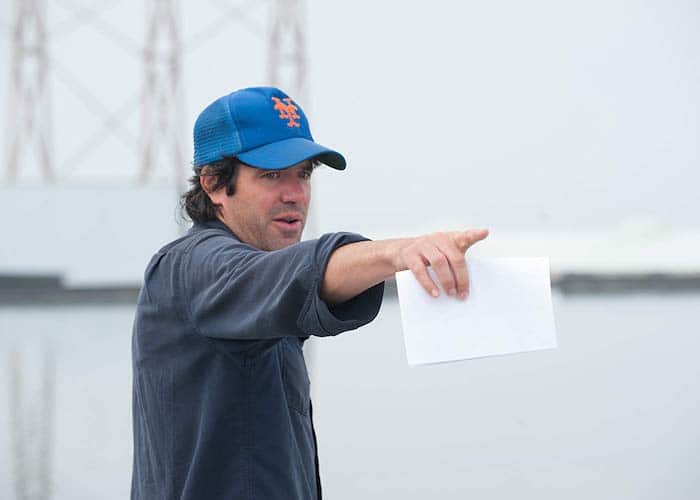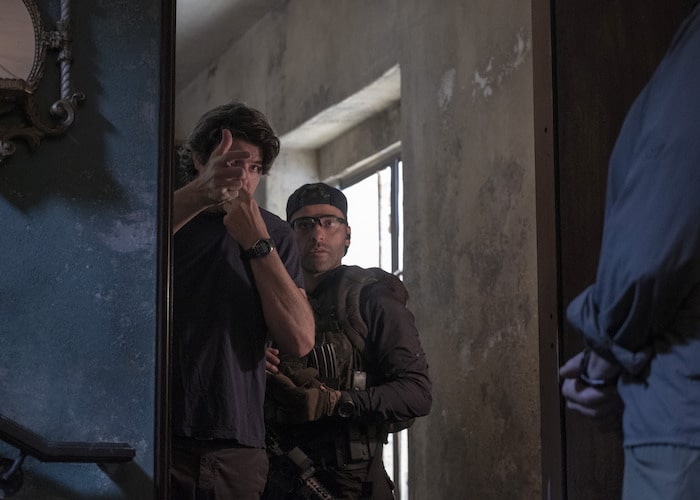J.C. Chandor directed commercials for 15 years before making his feature directorial debut with 2011’s Margin Call, a tense ensemble drama covering a 24-hour period at a Wall Street investment bank just before the bursting of the subprime mortgage bubble. Premiering at the Sundance Film Festival, the film was met to critical acclaim and earned Chandor an Academy Award nomination for Best Original Screenplay.
His sophomore effort, the daring, nearly dialogue-free one-man survival story All Is Lost (2013) was similarly well received, as was his third film, A Most Violent Year (2014). Now, he has thrown his hat in the streaming service ring with the Netflix-distributed Triple Frontier, an ensemble heist film starring Oscar Isaac, Ben Affleck, and Pedro Pascal. A distinctive filmmaker who keeps a firm handle on the reins of his projects from script to screen, Chandor has shared some great filmmaking advice in interviews over the years, including the following six tips:
Follow Your Gut
From a day-in-the-life ensemble drama full of Wall Street jargon (Margin Call) to a survival story with next to no dialogue (All Is Lost), Chandor’s films thus far have frequently defied conventional wisdom regarding what sort of material makes for compelling movie content. So if he’s not following conventional wisdom, what principles guide him? How does he avoid cliches? As he told The Atlantic in an October 2013 interview, he follows his gut above all:
“Every time I felt myself doing something a little too on the nose, my entire body seized up as writer and I didn’t go that way. That’s all I have, to follow that gut feeling.”
Let The Characters Finish Cooking First
There are a lot of different writing methods out there. While certain books of instruction insist that some strategies are more valid than others, the fact of the matter is that there are successful, accomplished writers out there that use just about every kind of writing strategy and schedule imaginable. Chandor’s own process, detailed in a January 2015 interview with SFGate, could also potentially serve as a handy template to any writers out there still trying to determine what method best suits them:
“I never actually start writing until I have the character fully cooked in my brain, and then I know it’s time to start getting down some dialogue. With Abel, I had this image of him sitting in a trailer formally dressed, hair cut within an inch of its life, everything about him is meticulous, formal, self-serious, and then his surroundings are total, utter decay. I saw that image so clearly and thought, OK, now it’s time to write this thing down.”

Turn Limitations Into Strengths
When Chandor started writing Margin Call, he knew he wanted to write something about the stock market crash that could be produced for under $1 million, and with his financial constraints in mind, he decided to limit his film to one location. In addition to serving practical purposes, he has found these restrictions can also be creatively rewarding, as he explained in a DP/30 video posted online in December 2011:
“Those limitations that I placed on myself—or that were sort of placed on me due to the budgetary constraints—in the end, if you kind of work with those instead of trying to fight against them, they can be strengths of the project.”
You can watch the full interview below; the featured quote begins at 4:45:
Luck Will Always Be A Factor
No matter how much time you put into planning and preparation, luck can still make or break a film at any stage of the game. However, as Chandor told Film Journal International in a December 2014 interview while discussing how a particularly memorable shot in A Most Violent Year came about because a barge happened to pass by just the right spot in the distance, your attitude towards dealing with the unexpected still has a major role in determining how the situation will play out:
“It was just dumb luck. That’s what I’ve found with my career. You can be prepared and ready to go, and then bad luck can sink you and there’s nothing you can do about it. But if you’re prepared to take advantage of it, good luck can be something wonderful.”

Know Exactly What You Want on Set
In an interview published in a 2012 issue of Film International, Chandor discussed his experience as a first-time feature director with Margin Call. In discussing how he worked with his ensemble cast, the filmmaker shared the following valuable lesson about getting the performances you want on set:
“If you don’t have the respect of the cast, if you don’t have the vision and you don’t communicate it, you’re not going to get what you want. The great thing I got from this film, and it’s a great lesson for me moving forward with new films, is that you have to know exactly what you want when you go on the floor, and you should never shoot something if you don’t.”

Have Your Actors Build Their Backstories
While Chandor makes sure his characters are crystal clear in his own head before he starts writing things down, he likes to have his actors build their own character backstories, as he explained in a video interview with We Got This Covered published December 2014, discussing how this process worked with A Most Violent Year co-stars Oscar Isaac and Jessica Chastain:
“[Chastain and Isaac] work together amazingly well to sort of grow in the backstory that I intentionally leave out of the final movie—which is, the script—but they as performers, and people who are going to play these people, have to know that. So I work extensively with them to kind of come up with what their narratives are so that they know who they are, even though it’s not—the audience doesn’t need to know that […] but the fact that it’s all there, and in the performances they’re giving, is key.”
You can watch the full interview below; the featured quote starts at 10:33:
What We Learned
Having some guiding principles can be incredibly useful. But ultimately, if making a good movie could actually be boiled down to a formula, Hollywood would have locked it down by now and would never produce a flop again. As Chandor indicates, a large portion of succeeding as a creative, of making new and distinctive films, comes from following your gut and making the movie you want to see, even if those ideas don’t align with conventional wisdom for what is most cinematically viable.
The post 6 Filmmaking Tips From J.C. Chandor appeared first on Film School Rejects.
0 comments:
Post a Comment